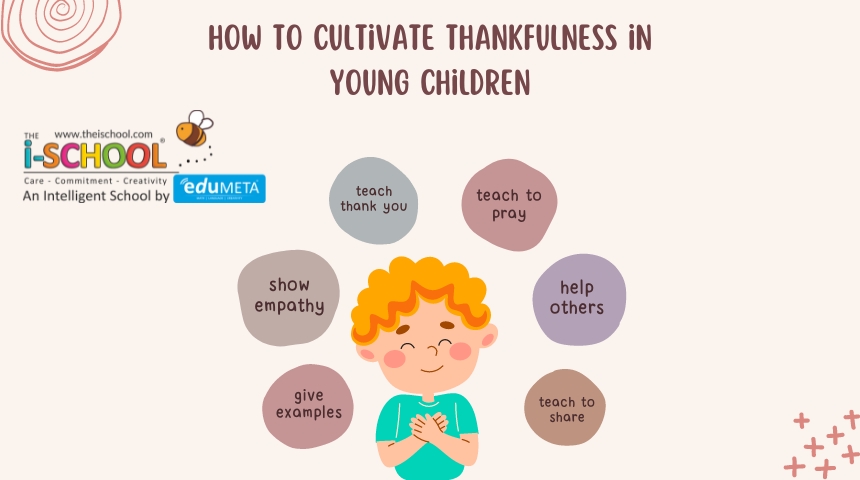How to Cultivate Thankfulness in Young Children

In a world that often emphasizes material wealth and instant gratification, teaching young children the value of gratitude can be a challenge but is essential. Cultivating thankfulness in young children helps them develop a positive outlook on life, appreciate what they have, and build meaningful relationships. This life skill, when nurtured from a young age, can lead to greater happiness and emotional well-being throughout their lives.
Why Gratitude Matters
Gratitude goes beyond simply saying “thank you.” It’s about recognizing and appreciating the good things in life, whether they’re big or small. Children who learn to be grateful tend to be more empathetic, less entitled, and better able to cope with challenges. They also develop stronger relationships with their family, friends, and community.
Simple Ways to Teach Gratitude
Model Thankfulness
Children learn by watching adults, so it’s important to model gratitude in your everyday actions. Regularly express appreciation for the things you have, the kindness of others, and the experiences that bring joy to your life. Whether it’s thanking the cashier at the grocery store or expressing gratitude for a beautiful day, your child will notice and emulate your behavior.
Create a Daily Gratitude Ritual
Establish a daily routine where your child can reflect on what they are thankful for. This could be a simple bedtime ritual where they share one or two things they appreciated about their day. Over time, this habit helps them focus on the positive aspects of life, even on tough days.
Encourage Thank-You Notes
Encourage your child to write thank-you notes for gifts, acts of kindness, or special experiences. Even if they’re too young to write, they can draw a picture or dictate their thoughts to you. This practice helps them understand the importance of acknowledging and appreciating others’ efforts.
Involve Them in Acts of Kindness
Engage your child in acts of kindness, such as donating toys, helping a neighbor, or volunteering together. These experiences teach children the value of giving and the impact it has on others. They also help children see how fortunate they are, which can foster a deeper sense of gratitude.
Practice Mindful Gratitude
Incorporate mindfulness into your child’s daily routine by encouraging them to be fully present and aware of their surroundings. Ask them to notice the beauty in nature, the comfort of a warm bed, or the joy of playing with friends. Mindful gratitude helps children appreciate the present moment and the simple pleasures in life.
Gratitude Jar
Create a “gratitude jar” where your child can drop in notes about things they’re thankful for. Over time, this jar will fill up with positive memories and reminders of the good things in their lives. On challenging days, revisit the jar to reinforce the habit of focusing on the positives.
Teach Empathy
Help your child understand the feelings and needs of others by discussing different scenarios where someone might need support or kindness. Encourage them to think about how they would feel in that situation and how they could help. This not only builds empathy but also reinforces the importance of being grateful for what they have.
Celebrate Gratitude Together
Make gratitude a family affair by celebrating moments of thankfulness together. Whether it’s during a holiday, a special occasion, or just a regular day, take the time to share what each family member is grateful for. This creates a supportive environment where gratitude is valued and encouraged.
Use Storytelling
Read books or share stories that emphasize themes of gratitude and thankfulness. Stories can be powerful tools to help children understand complex emotions and the importance of appreciating what they have.
Encourage Sharing
Teach your child the joy of sharing, whether it’s their toys, time, or talents. Sharing with others helps them understand that giving can be just as rewarding as receiving, fostering a sense of gratitude for the opportunity to help others.
The Long-Term Impact of Gratitude
Children who grow up with a strong sense of gratitude are more likely to develop into compassionate, resilient adults. They’re better equipped to handle life’s ups and downs, maintain positive relationships, and contribute meaningfully to their communities. By instilling these values early on, you’re giving your child a gift that will serve them well throughout their lives.
Conclusion: Raising Thankful Children
Cultivating thankfulness in young children is a gradual process that requires patience and consistency. By modeling gratitude, creating opportunities for reflection, and engaging in acts of kindness, you can help your child develop a lasting sense of appreciation for the world around them. Remember, gratitude is a skill that grows with practice, and the more your child practices, the more grateful they will become.
